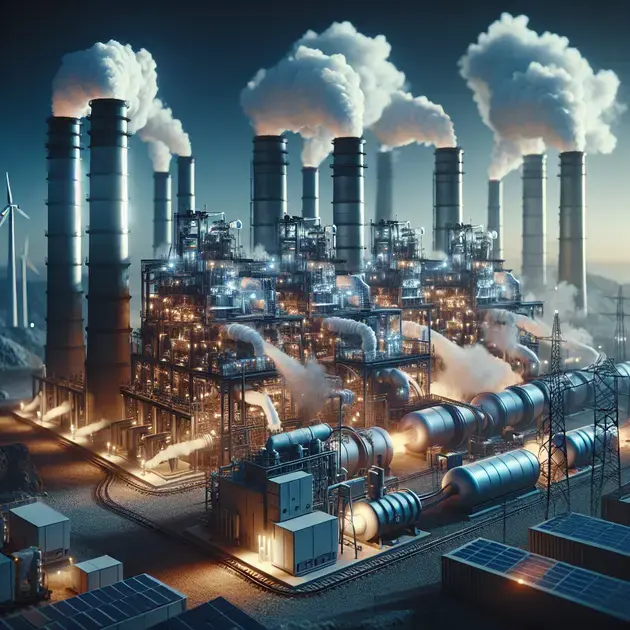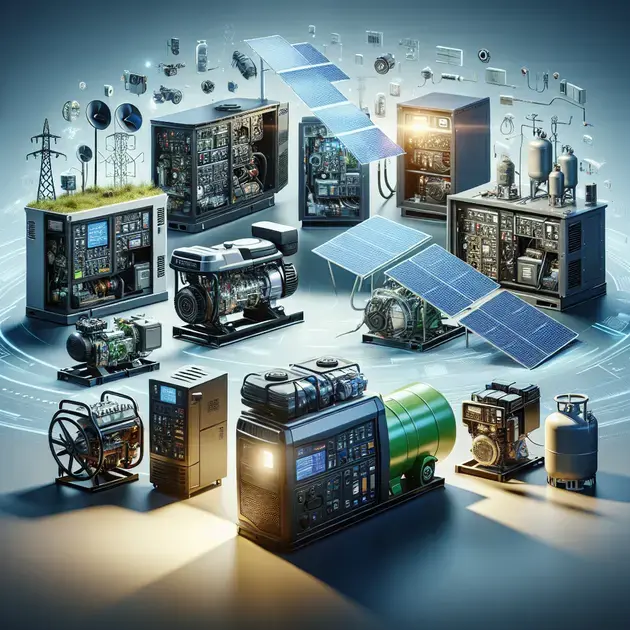Are you ready to learn everything about power generators? In this ultimate guide, we will dive deep into the world of generating power. Whether you are a homeowner looking for a backup power source or a business owner in need of a reliable energy solution, this guide has got you covered.
With the increasing frequency of power outages due to extreme weather conditions and aging power grids, having a power generator is becoming more crucial than ever. This guide will walk you through the different types of generators, their functionalities, maintenance tips, and much more. Stay tuned to become a pro in generating power!
Understanding Power Generators
A power generator is a device that converts mechanical energy into electrical energy, providing a temporary power source in case of blackouts or when electricity is not readily available. Understanding how power generators work can help you make informed decisions when choosing the right generator for your needs.
How do Power Generators Work?
Power generators work on the principle of electromagnetic induction, where a conductor moving through a magnetic field produces an electric current. The basic components of a power generator include an engine, alternator, fuel system, voltage regulator, and cooling system. The engine drives the alternator, which generates electricity that is then regulated to provide a consistent voltage output.
To understand power generators better, you can refer to online resources such as Generac or Briggs & Stratton websites. These sites offer detailed explanations and tutorials on how power generators function.
Types of Power Generators
There are several types of power generators available, each suited for different applications and power requirements. The most common types include portable generators, inverter generators, standby generators, and solar generators.
Portable generators are small, mobile units that are ideal for powering essential appliances during power outages or outdoor activities. Inverter generators are known for their quiet operation and clean power output, making them suitable for sensitive electronics.
Standby generators are permanently installed and automatically turn on when there is a power outage, providing uninterrupted power to your home or business. Solar generators harness energy from the sun to generate electricity, offering a renewable and eco-friendly power solution.
To explore more about the types of power generators, you can visit websites like Home Depot or Cummins. These platforms provide a range of generator options with detailed specifications and features.
Maintenance Tips for Power Generators
Regular maintenance is essential to ensure that your power generator operates efficiently and reliably when needed. By following some simple maintenance tips, you can extend the lifespan of your generator and avoid unexpected breakdowns.
Some key maintenance tasks include checking the oil level, air filter, spark plug, and fuel system regularly. It is also important to run the generator periodically to keep it in good working condition and prevent fuel from stagnating.
Websites such as Briggs & Stratton or Generac offer maintenance guides and tutorials for specific generator models. Following the manufacturer’s recommendations and guidelines can help you maintain your generator effectively.
By implementing proper maintenance practices and staying informed about your power generator, you can ensure reliable performance and peace of mind during power outages or emergencies.
Different Fuel Options for Power Generators
When it comes to choosing a fuel option for your power generator, there are several factors to consider. Different fuel types offer varying levels of efficiency, cost-effectiveness, and environmental impact. Let’s explore some of the most common fuel options for power generators:
Diesel
Diesel is a popular fuel choice for power generators due to its efficiency and reliability. Diesel generators are known for their long lifespan and ability to provide a consistent power output. While diesel fuel can be more expensive than other options, it is often preferred for its reliability in critical situations.
Natural Gas
Natural gas is another common fuel option for power generators. It is a clean-burning fuel that produces lower emissions compared to diesel. Natural gas generators are quieter and require less maintenance than diesel generators. However, availability of natural gas supply can be a limitation in some areas.
Propane
Propane generators are popular for their portability and ease of use. Propane is a clean-burning fuel that can be stored for long periods without deterioration. Propane generators are often used in recreational vehicles and outdoor activities where access to other fuel types may be limited.
Biodiesel
Biodiesel is a renewable fuel option made from organic materials such as vegetable oils. Biodiesel generators are environmentally friendly and produce lower emissions compared to traditional diesel generators. However, biodiesel can be more expensive and may require modifications to the generator.
Hybrid Systems
Hybrid power generator systems combine multiple fuel sources, such as solar energy and diesel, to provide a more sustainable and efficient power solution. These systems offer flexibility and can help reduce overall fuel consumption and emissions. However, hybrid systems may require a higher initial investment.
Choosing the Right Size Generator for Your Needs
When selecting a power generator, it is crucial to determine the right size for your specific needs. Choosing a generator that is too small may not provide enough power, while selecting one that is too large can lead to inefficiency and increased operating costs. Here are some steps to help you choose the right size generator:
Calculate Your Power Requirements
Start by calculating the total power requirements of the appliances and devices you need to power during an outage. Consider both the starting and running wattage of each item to determine the total power load.
Choose the Right Generator Size
Once you have determined your power requirements, select a generator that can handle the total load with some extra capacity for future needs. Generators come in various sizes, from portable units for small loads to large standby generators for whole-house power.
Consider Fuel Efficiency
Look for a generator that offers optimal fuel efficiency to minimize operating costs. Consider the fuel consumption rate and runtime of the generator to ensure it meets your needs without wasting fuel.
Factor in Environmental Impact
Consider the environmental impact of the generator’s fuel type and emissions. Opt for cleaner fuel options or consider hybrid systems that reduce emissions and reliance on traditional fuels.
Consult with a Professional
If you are unsure about the right generator size for your needs, consult with a professional generator installer or electrician. They can assess your requirements and recommend the best generator size and type for your specific situation.
Environmental Impact of Power Generator Usage
The environmental impact of power generator usage is a crucial consideration in today’s world where sustainability is a top priority. While generators provide backup power during outages, their emissions and fuel consumption can have negative effects on the environment. Here are some factors to consider:
Emissions
Traditional fossil fuel generators produce emissions such as carbon dioxide, nitrogen oxides, and particulate matter that contribute to air pollution and climate change. Opting for cleaner fuel options or hybrid systems can help reduce emissions and minimize environmental impact.
Noise Pollution
Power generators can also contribute to noise pollution, especially in residential areas. Selecting generators with lower noise levels or proper soundproofing can help mitigate this impact on the environment and surrounding community.
Resource Consumption
The fuel consumption of power generators can deplete natural resources and contribute to the extraction and processing of fossil fuels. Choosing renewable fuel options or energy-efficient systems can help lessen the strain on natural resources and promote sustainability.
Regulatory Compliance
Ensure that your power generator meets regulatory standards for emissions and environmental impact. Complying with local regulations and incorporating eco-friendly practices can help reduce the environmental footprint of power generator usage.
Sustainability Practices
Consider implementing sustainability practices such as regular maintenance, proper disposal of waste materials, and investing in energy-efficient generator technologies. These practices can help minimize the environmental impact of power generator usage and support a greener future.
Conclusion
Choosing the right fuel option for power generators is a crucial decision that involves balancing efficiency, reliability, and environmental impact. Diesel, natural gas, propane, biodiesel, and hybrid systems each offer unique advantages and considerations. Diesel stands out for its reliability in critical situations but comes with a higher cost, while natural gas is cleaner and quieter but may face limitations in supply. Propane generators are portable and easy to use, making them ideal for various applications. Biodiesel presents an environmentally friendly option, albeit with some cost and modification requirements. Hybrid systems, combining different fuel sources, provide a sustainable solution with flexibility and efficiency.
When selecting a generator size, it is essential to calculate your power requirements accurately to avoid inefficiencies and increased costs. Consider fuel efficiency to minimize operating expenses and choose a generator that aligns with your environmental values. Consulting with professionals can help ensure you select the right generator size and type for your specific needs, optimizing performance and cost-effectiveness.
The environmental impact of power generator usage is a significant concern, with emissions, noise pollution, resource consumption, and regulatory compliance being key factors to consider. Opting for cleaner fuel options, implementing sustainability practices, and complying with regulations can help minimize the negative effects on the environment. By prioritizing eco-friendly practices and efficient technologies, you can reduce the environmental footprint of power generator usage and contribute to a greener future.

